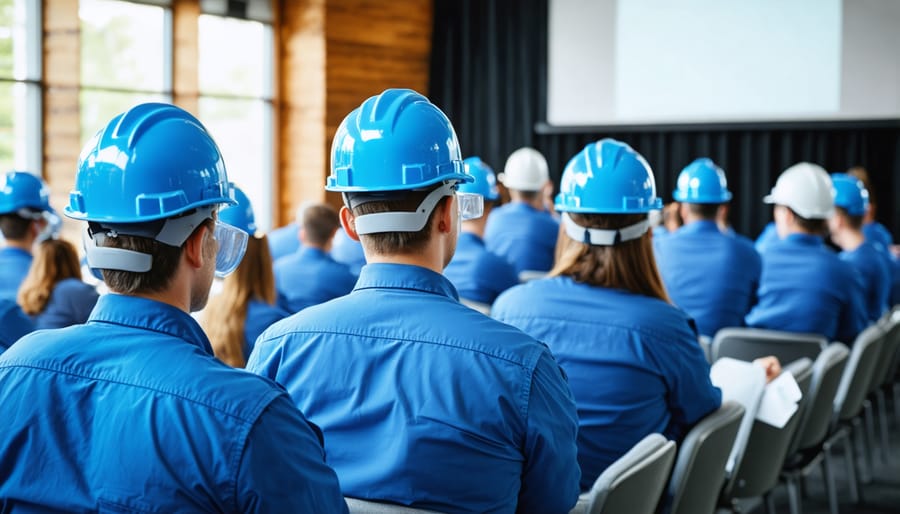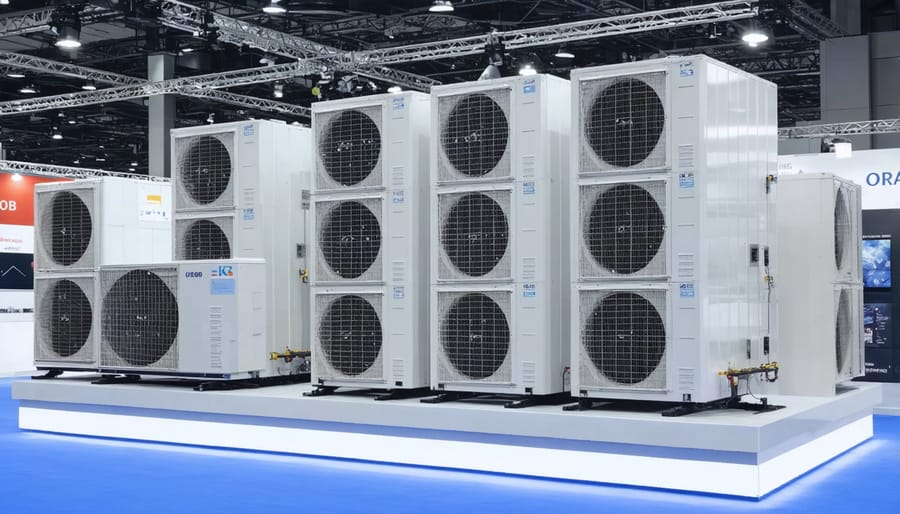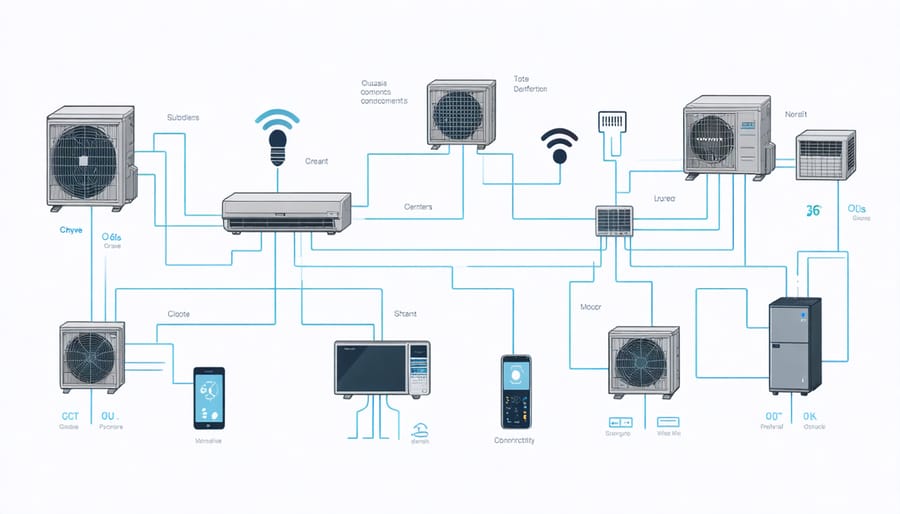HVAC industry associations stand as the backbone of professional excellence and innovation in heating, ventilation, and air conditioning. These organizations shape technical standards, drive sustainability initiatives, and foster collaborative relationships that define modern HVAC practices. From ASHRAE’s research-driven approach to ACCA’s contractor-focused programs, these associations collectively represent over 200,000 professionals worldwide and influence more than $80 billion in annual industry revenue.
Through strategic partnerships, certification programs, and regulatory advocacy, these organizations have transformed individual HVAC professionals into a powerful collective force. Their impact extends beyond traditional boundaries, addressing emerging challenges in energy efficiency, smart building technologies, and environmental sustainability. For business owners, contractors, and technical professionals, understanding and leveraging these associations has become essential for staying competitive in an increasingly complex marketplace.
With stringent certification requirements, continuing education programs, and access to cutting-edge research, these organizations serve as both guardians of industry standards and catalysts for innovation. Their role in shaping the future of HVAC technology and practices makes them indispensable partners in professional growth and business success.
Major Global HVAC Associations
ASHRAE’s Global Influence
ASHRAE (American Society of Heating, Refrigerating and Air-Conditioning Engineers) stands as the global leader in developing and maintaining HVAC industry standards, with its influence extending far beyond North American borders. The organization’s technical standards and guidelines are referenced in building codes across more than 100 countries, serving as the foundation for HVAC system design, installation, and maintenance worldwide.
Through its network of 200+ chapters and more than 57,000 members in 132 countries, ASHRAE facilitates knowledge exchange and technological advancement on an international scale. The society’s research programs, which invest millions annually in cutting-edge HVAC&R research, have led to groundbreaking developments in energy efficiency, indoor air quality, and sustainable building practices.
ASHRAE’s technical resources, including the widely-respected ASHRAE Handbook series, provide comprehensive engineering guidance that shapes industry practices globally. The organization’s involvement in developing international standards, particularly through collaborations with ISO and CEN, ensures consistency in HVAC practices across borders.
The society’s global training programs and certification schemes have become industry benchmarks, while its regular international conferences serve as crucial platforms for sharing innovations and best practices. ASHRAE’s commitment to addressing climate change through sustainable HVAC solutions has positioned it as a key player in global environmental initiatives, particularly in developing energy-efficient building standards and green technology solutions.
International Partnerships
In today’s globalized HVAC industry, cross-border collaboration between major associations has become increasingly vital for addressing global challenges and advancing industry standards. Organizations like ASHRAE have established strategic partnerships with counterparts such as REHVA (Federation of European Heating, Ventilation and Air Conditioning Associations) and ISHRAE (Indian Society of Heating, Refrigerating and Air Conditioning Engineers) to facilitate knowledge exchange and technological innovation.
These international partnerships have yielded significant benefits, including harmonized technical standards, joint research initiatives, and shared resources for professional development. Notable achievements include the development of unified energy efficiency protocols and sustainable building guidelines that are now recognized across multiple jurisdictions.
Regular international conferences and symposiums bring together expertise from different regions, fostering innovation and best practice sharing. The Global Alliance of Building Commissioning Organizations (GABCO) exemplifies this approach, connecting commissioning authorities worldwide to establish universal quality standards.
Digital platforms have further enhanced these partnerships, enabling real-time collaboration on technical committees and research projects. Virtual knowledge-sharing portals now connect HVAC professionals across continents, facilitating rapid response to emerging industry challenges and technological advancements.
These collaborative efforts are particularly crucial in addressing global concerns such as climate change, energy efficiency, and indoor air quality standards, demonstrating the industry’s commitment to sustainable and standardized solutions worldwide.
Professional Development and Certification

Certification Programs
Professional certifications in the HVAC industry serve as crucial benchmarks for expertise and competency, establishing standards of excellence across the sector. Leading industry associations offer comprehensive certification programs that validate technical knowledge, practical skills, and professional development.
NATE (North American Technician Excellence) certification stands as the industry’s most recognized credential, offering specialized certifications in areas such as air conditioning, heat pumps, and commercial refrigeration. These certifications require rigorous testing and periodic renewal, ensuring professionals maintain current knowledge of evolving technologies and practices.
ASHRAE (American Society of Heating, Refrigerating and Air-Conditioning Engineers) provides advanced certifications focusing on sustainable design, building energy assessment, and high-performance building operations. Their programs particularly appeal to engineers and designers seeking to demonstrate expertise in specialized areas of HVAC systems.
The ACCA (Air Conditioning Contractors of America) offers certifications for both individuals and companies, including the Quality Assured (QA) program and technical certifications in system design and installation. These credentials help differentiate professionals in the marketplace while ensuring adherence to industry best practices.
For facility managers and building operators, BOMI International’s Systems Maintenance Administrator (SMA) certification provides comprehensive training in building systems operation and maintenance. This certification emphasizes practical knowledge and operational efficiency.
These certification programs typically require a combination of experience, education, and examination success. Many employers now mandate specific certifications for certain positions, making them essential for career advancement. Regular recertification requirements ensure professionals stay current with industry developments, technological innovations, and regulatory changes.
Continuing Education Initiatives
HVAC industry associations play a crucial role in promoting continuous education and professional development within the sector. These organizations establish comprehensive learning frameworks that help professionals stay current with evolving technologies, regulations, and best practices.
Leading associations like ASHRAE and ACCA offer structured certification programs and educational resources that address various specialization areas, from energy efficiency to system design. These programs typically combine theoretical knowledge with practical applications, ensuring professionals can immediately implement their learning in real-world situations.
Many associations have developed online learning platforms that provide flexible access to educational content, including webinars, virtual workshops, and self-paced courses. These digital resources have become increasingly important, allowing professionals to maintain their educational requirements while managing busy schedules.
Continuing education requirements vary by region and certification level, but most associations mandate a specific number of learning hours or credits annually. For example, some certifications require 15-30 professional development hours (PDHs) per year to maintain active status. These requirements ensure that HVAC professionals consistently update their knowledge and skills.
Industry associations also collaborate with manufacturers and technology providers to offer specialized training on new equipment and innovative solutions. This partnership approach ensures that educational content remains relevant and aligned with current market demands.
Furthermore, many associations provide preparation courses for state licensing exams and professional certifications, helping members advance their careers while maintaining high industry standards. They also regularly update their educational content to reflect changes in building codes, environmental regulations, and energy efficiency standards.
Industry Events and Networking
Annual Conferences
The HVAC industry’s calendar is marked by several significant annual conferences that serve as crucial networking and knowledge-sharing platforms. The AHR Expo, North America’s largest HVAC industry event, attracts over 70,000 professionals annually, featuring cutting-edge technology demonstrations and expert-led educational sessions across three intensive days.
ASHRAE’s Winter and Annual Conferences stand out as premier technical events, offering comprehensive programming on sustainable building practices, emerging technologies, and industry standards. These bi-annual gatherings provide valuable opportunities for professionals to earn continuing education credits while engaging with industry leaders.
The ACCA Conference and Expo focuses specifically on residential and commercial contracting, addressing business management strategies alongside technical innovations. This event typically features hands-on workshops and roundtable discussions tailored to contractors’ needs.
Regional conferences like the Eastern Energy Expo and the HVAC Excellence Conference offer more targeted networking opportunities and specialized content for specific market segments. These events often include trade shows showcasing local vendors and region-specific solutions.
International events such as MCE (Mostra Convegno Expocomfort) in Milan and ISH in Frankfurt provide global perspectives on HVAC innovations and market trends, making them essential for professionals involved in international markets or seeking broader industry insights. These conferences typically feature multilingual presentations and cross-cultural networking opportunities.

Regional Meetups
Regional meetups form the backbone of HVAC industry networking and professional development at the local level. These gatherings, typically organized by local chapters of major HVAC associations, provide invaluable opportunities for face-to-face interaction among industry professionals, suppliers, and contractors.
Most regional chapters host monthly or quarterly meetings featuring technical presentations, code update discussions, and industry trend analysis. These events often include dinner or breakfast sessions, making networking natural and comfortable for attendees. Educational seminars and workshops frequently accompany these meetups, offering continuing education credits essential for maintaining professional certifications.
Local chapters regularly organize facility tours, allowing members to observe best practices and innovative installations firsthand. These site visits provide practical insights into system design, installation techniques, and maintenance procedures that members can apply to their own projects.
Annual regional conferences serve as larger-scale networking events, often drawing hundreds of professionals from surrounding areas. These conferences typically feature expert panels, product exhibitions, and specialized training sessions. Many chapters also coordinate with local trade schools and universities, creating mentorship opportunities and fostering connections between experienced professionals and emerging talent.
To maximize the value of regional meetups, many chapters now offer hybrid events, combining in-person networking with virtual participation options, ensuring accessibility for all members regardless of location or schedule constraints.
Future Trends and Industry Direction
Sustainability Initiatives
Leading HVAC industry associations are at the forefront of promoting sustainable practices and environmental stewardship within the construction sector. These organizations actively participate in developing and implementing green building standards while helping members navigate complex environmental regulations.
Major associations collaborate with organizations like USGBC (U.S. Green Building Council) and ENERGY STAR to establish certification programs and sustainability metrics. They provide essential guidance on energy-efficient HVAC system design, refrigerant management, and renewable energy integration. Members receive regular updates on environmental compliance requirements and access to specialized training programs focused on sustainable technologies.
These organizations also contribute to policy development, working with governmental agencies to shape regulations that promote energy efficiency and reduce environmental impact. They maintain comprehensive databases of best practices for sustainable HVAC operations and offer certification programs specifically tailored to green building operations.
Key initiatives include promoting the adoption of smart building technologies, supporting research into alternative refrigerants with lower global warming potential, and developing guidelines for integrating renewable energy systems with HVAC equipment. Through these efforts, industry associations help members stay competitive while contributing to global sustainability goals and meeting increasingly stringent environmental standards.
Technology Integration
Industry associations are increasingly focusing on technological advancement, particularly in the realm of smart HVAC systems and Internet of Things (IoT) integration. These organizations play a crucial role in establishing standards and best practices for implementing connected technologies, ensuring interoperability, and maintaining cybersecurity protocols.
Leading associations have developed specialized committees dedicated to analyzing and promoting emerging technologies, including artificial intelligence-driven climate control, predictive maintenance systems, and building automation platforms. They provide essential guidance on integrating these solutions while maintaining compliance with industry regulations and safety standards.
The IoT revolution in HVAC has prompted associations to create certification programs specifically focused on digital competencies. These programs help professionals master advanced building management systems, data analytics, and remote monitoring capabilities. Industry groups also facilitate knowledge sharing through technology-focused workshops, webinars, and demonstration projects.
Looking ahead, associations are actively shaping the future of HVAC technology by participating in research initiatives, contributing to international standards development, and fostering collaboration between manufacturers, installers, and end-users. Their work ensures that technological advancement aligns with practical industry needs while promoting energy efficiency and sustainability goals.
Through these efforts, industry associations continue to bridge the gap between traditional HVAC practices and cutting-edge technology, enabling members to stay competitive in an increasingly digital marketplace.

HVAC industry associations continue to play a pivotal role in shaping the future of heating, ventilation, and air conditioning professionals. These organizations serve as crucial pillars that support industry advancement through standardization, education, and advocacy. By fostering collaboration between professionals, manufacturers, and stakeholders, these associations drive innovation and maintain high industry standards. Their certification programs, technical resources, and networking platforms have become indispensable tools for career advancement and business growth. As the HVAC industry evolves to meet new challenges in energy efficiency, sustainability, and technological integration, these associations remain at the forefront of guiding professionals through changing landscapes. Their continued commitment to excellence ensures that HVAC professionals stay competitive, compliant, and capable of delivering superior solutions in an increasingly complex market environment.

